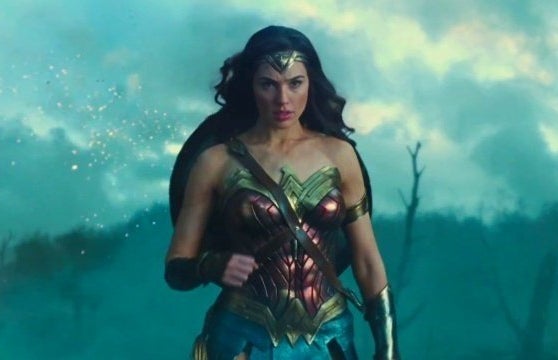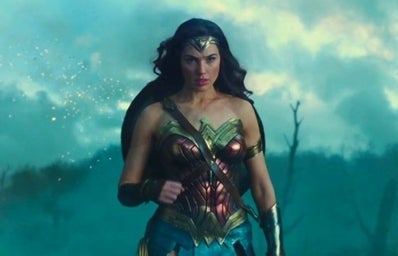As most of us know, one of the most endearing parts of film and storytelling is the hero. This could not be truer for our current cinematic landscape. Everywhere you look, there are new comic book and superhero movies being produced on a massive scale like never before. Every one of these movies wants to get ahead, to be unique, and to make the most money while also having the best story. One of the movies in this genre that stuck out over the past few years was Wonder Woman, directed by Patty Jenkins. Wonder Woman aka Diana Prince’s appeal as a hero of truth, justice, and love was global. The movie was not only a box office success, but a critical one as well, earning a 92% Certified Fresh rating on Rotten Tomatoes. While there have been movies before about superheroes who wanted to save the world, Wonder Woman uniquely stands out to me not only because of her message about believing in love in order to help humanity, but also because of the fact that never before had a woman been depicted so honestly as a human being on film before. It is impossible in 2019 to ignore the fact that women’s empowerment is a powerful theme of the era, and Wonder Woman proudly displays its hero and the women around her as the strong, capable, and dimensional people they are. Diana Prince is a multifaceted and complex hero, who is presented as such, instead of any generic stereotype, and therefore, her message transcends the film she appears in.
For women, there has consistently been a lack of representation in storytelling when it came to our perspective. Speaking as a woman myself, the only times I honestly saw myself represented as a human being and not a stereotype in stories are the times when the protagonist of the story is a younger child, and even then, there were many girl characters whose identities simply revolved around being female. Many women have pointed out this discrepancy, in Hollywood in particular, with actress Jessica Chastain recently stating after watching 20 films at the Cannes Film Festival in 2017 that, “It was quite disturbing to me, to be honest – with some exceptions. I hope when we include female storytellers, they will be more like the women I know in my day-to-day life. They are proactive, have their own point of view and don’t just react to men around them,” This trend is true even as we look back thousands of years ago to the first stories being told. While poignant in the point that they make, many of these stories with women in them still revolved around the lives and perspectives of men during their times. One of the oldest stories, that being the story of Ashurbanipal, his Queen is reduced to one single piece of artwork in the story, to sit alongside him to cheer on his victory. While of course, this was thousands of years ago in which the gender roles in society were much more strict and harder to overcome, it is still an important concept to understand in terms of why Wonder Woman becomes the powerful film it does. One of the best scenes of Wonder Woman comes at the beginning of the movie, in which we see multiple Amazons on Diana’s home island of Themyscira training, and then afterward when Themyscira is invaded by German soldiers, the all-female army comes out to fight. Before this, I had not seen a big-budget blockbuster in which there were all-female battle and fighting sequences, even though Wonder Woman clearly shows that women are capable of making these scenes just as compelling as men do. The only other one to come after this has been Avengers: Endgame, and even that is not as nuanced as Wonder Woman in its portrayal. Not only do the Amazons train and fight together, but the women who make up the island of Themyscira are shown to all have different builds, body-shapes, and racial backgrounds. Of course, you could argue that making women with the ability to fight is nothing new in modern storytelling and filmmaking. What sets this movie and these women apart is that in other scenes, the women around Diana’s inner circle (including Diana herself) are shown to have complex personalities right alongside their ability to fight. They are able to be vulnerable people with real emotions while still remaining skilled warriors. In making the people around Diana women I not only looked up to but could relate to, it only made the story that much more immersive and real to me. Wonder Woman’s greatest triumph is being able to show a realistic depiction of humanity; people that feel like real people, and while I used the examples of the Amazons and Diana to prove this, every character in Wonder Woman that is shown has a unique set of goals, emotions, skills, and personality that makes them stick out.
I would be remiss if I did not also discuss Diana’s primary message that she gives to those around her, and through this, the audience. The relationship in Wonder Woman between Diana and her partner, Steve, deserves a whole article of its own to discuss what an amazing portrayal of an adult relationship with respect and love should look like. However, the relationship is not only central to helping Diana achieve her main goal of defeating Ares to stop World War I, but also to helping her understand the human world outside Themyscira and grow as a person. There are many, many films that depict a male and female lead falling in love. The reason why Steve and Diana’s relationship is different is that unlike those other movies, Diana is treated as a complete equal to Steve in the relationship. She is given the utmost respect by Steve, and the two have a close bond outside of their romantic chemistry as they truly get to know each other. Steve never once makes fun of Diana or treats her as stupid or less than him even as she talks about defeating the Greek God Ares and marvels at ice cream as she tries it for the first time. Near the end of the film, Diana is frustrated by the fact that she has killed who she thinks is Ares and the war did not immediately end. She begins to doubt that humanity is good or that they even deserve to be saved, to which Steve replies, “It is not about deserve! It is about believe!” as he tries to get through to her. Steve later tragically sacrifices himself in order to save innocent lives from being gassed with poison, and later Diana remembers his words before delivering her final blow to Ares. She repeats back to Ares when he says that humanity is evil and doesn’t deserve saving that, “You’re wrong about them. They are everything you say but so much more. […] It is not about deserve. It is about believe, and I believe in love.” This line is the most powerful in the entire movie, as its message is clear: we are all flawed human beings, but even then, we still need to believe in love in order to help one another. We all have flaws, even Diana, but it is that we recognize them and accept them so that we can move forward together.
In short, Wonder Woman was such a hit for a number of film reasons which included casting, setting, dialogue, cinematography, and more. However, in examining why a movie is powerful, and why it can so heavily affect people like myself, the larger themes are the most important things to look at. They are what can make or break something like Wonder Woman, which while continuing the important tradition of storytelling with heroes to root for, also must compel us as an audience to contemplate the larger picture of humanity, just as the first stories we told as humans such as the Epic of Gilgamesh did. This is the reason I love this film so much, and I hope that everyone gets a chance to see it at least once.


